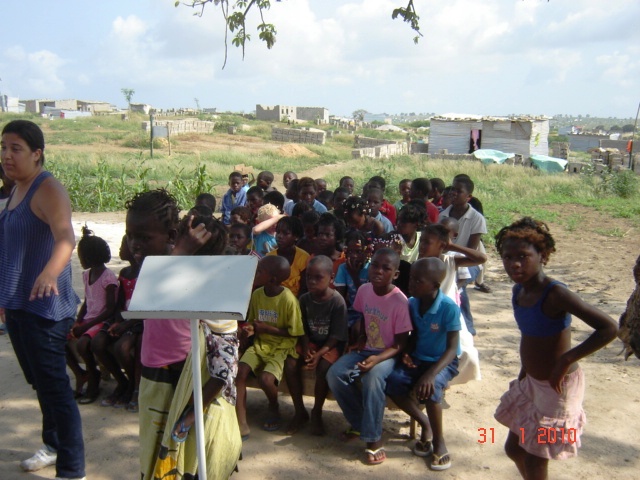
In the heart of Angola lies a quiet but powerful transformation — a movement that begins with children and extends to families, communities, and the soul of a growing nation. The Mulenvos de Cima Project, located in the municipality of Viana, just 18 kilometers from Luanda, is more than a development initiative. It is a statement of belief: that every child matters, that every life holds value, and that dignity is not a privilege — it is a right.
Viana, a municipality with a vast area of over 1,300 square kilometers and home to nearly a million people, stands at a complex crossroads. On one hand, it is rapidly expanding, a symbol of Angola’s growth and urbanization. On the other, it wrestles daily with poverty, fragile infrastructure, and systemic inequality. In places like Mulenvos de Cima, the sharp edges of this paradox are felt most acutely by children. They are the ones growing up in informal settlements, far from health clinics, without nearby schools, and often without running water or electricity.
To understand the significance of the Mulenvos de Cima Project, one must first see through the eyes of a child living in Viana. Imagine walking several kilometers every day to attend a school where classes are overcrowded, teachers are exhausted, and materials are scarce. Imagine living in a house made of corrugated metal, where rain leaks through the roof and the nights are filled with uncertainty. For many families, this is not imagination — it is reality.
Yet amidst these challenges, a beacon of hope has emerged.
The Mulenvos de Cima Project was born from compassion, but it is built on strategy, vision, and relentless commitment. It recognizes that development cannot be imposed from the outside — it must be grown from within. That’s why the project focuses on children: because they are not just the future; they are the present. They are capable, curious, resilient, and full of untapped potential.
At the center of the initiative is a Christian school grounded in four simple but radical values: Dignity, Love, Value, and Childhood.
Dignity means that no child is treated as a burden, no matter their background. Every student is greeted by name. Every child receives a uniform, not just for the sake of appearance, but as a symbol of belonging. Classrooms are designed to be clean, colorful, and respectful of the child’s need for safety and stimulation. Dignity is embedded in the school culture — in how teachers listen, in how discipline is applied with compassion, and in how parents are invited to be part of their children’s learning journey.
Love is not a side benefit of education; it is central. The school staff understands that many children arrive carrying invisible burdens: hunger, trauma, neglect. Teachers are trained not only in pedagogy but in empathy. Love shows up in the breakfast served in the morning, in the music sung together in class, and in the patience shown when a child struggles to read or write. It’s in the way volunteers sit beside the students, hold their hands, and cheer their smallest victories. This is not charity. It’s family.
Value is affirmed through action. Children are taught not just to repeat facts but to think, explore, and ask questions. Lessons incorporate stories from Angolan culture, local history, and real-life problem-solving. There is a focus on practical skills — hygiene, nutrition, communication — because knowledge must translate into daily survival and long-term growth. Each student is reminded, again and again, that they are valuable. Not because of their grades or circumstances, but simply because they are human.
And finally, Childhood is protected. In a world that too often forces children to grow up too quickly, the Mulenvos de Cima school is a place where kids can still be kids. There are games, songs, drawing, dancing, storytelling. There are swings and footballs and laughter. Childhood is not treated as a luxury but as a foundational right. It is the soil in which everything else grows.
But the school is only the beginning. From its humble foundation, the Mulenvos de Cima Project has expanded its vision. Community outreach is a critical part of its work. Parents are engaged through workshops on health, parenting, and small business skills. Mothers are given a space to meet, support one another, and learn about nutrition and sanitation. Local leaders are involved in planning and are encouraged to take ownership of the progress.
One of the most remarkable aspects of the project is its commitment to local empowerment. Rather than importing solutions, it invests in local teachers, builders, and volunteers. Training is provided not only to improve professional capacity but to build confidence and pride. Community members are not just recipients of aid — they are co-creators of their future.
And the impact? It can be seen in the eyes of the children.
There’s Ana, a 7-year-old who once struggled to speak in class and now leads morning prayers. There’s Paulo, who discovered a love for drawing and now dreams of becoming an architect. There’s Teresa, whose mother used to clean houses but now runs a small food stand thanks to training she received through the program. These stories are not miracles — they are the result of patient, thoughtful, long-term investment in people.
The ripple effects go beyond the classroom. When a child comes home and washes their hands before dinner, the family follows suit. When a child teaches their siblings a song in Portuguese or English, learning spreads. When a child brings home a book, literacy is seeded in the household. Education here is not confined to walls — it is a living, breathing force that transforms entire neighborhoods.
Of course, the challenges remain vast. Viana continues to grow, and with growth comes strain. New families arrive every week, seeking opportunity but often finding hardship. The pressure on public services is immense. The cost of food and transport is rising. Climate change is making weather less predictable, causing flooding in areas with poor drainage and intensifying health risks.
But the Mulenvos de Cima Project stands as a resilient response — adaptive, grounded, and full of heart. It doesn’t pretend to solve every problem. Instead, it shows what can happen when we begin somewhere, when we refuse to accept that poverty should define a child’s destiny, and when we believe that love, structure, and community can build something lasting.
The project also offers a model for other regions. Its success lies not in flashy infrastructure or international headlines, but in consistency, relational depth, and ethical clarity. It reminds us that effective development is not about handouts. It’s about partnership.
This is a powerful message in a global context where too many interventions are top-down, temporary, and unsustainable. The world doesn’t need more abandoned school buildings. It needs spaces that live, grow, and reflect the hopes of those who use them.
And it’s also a reminder of how interconnected our global community is. When individuals or organizations abroad choose to support projects like Mulenvos de Cima — through donations, visits, prayer, or awareness campaigns — they are not just giving money. They are joining hands with a community. They are saying, “You are not forgotten. You are worthy.”
What’s more, the project invites reflection on what we mean by progress. In a world obsessed with metrics and speed, the quiet transformation of a child learning to read, of a mother starting a business, or of a teacher gaining confidence, is deeply radical. It may not show up on stock charts, but it shapes the future more profoundly than most headlines.
As the school continues to expand, dreams follow. Plans are underway to open a library, a health post, and more vocational training for adolescents. There’s hope for a small farm that can teach sustainable agriculture while feeding students. There are dreams of digital classrooms, exchange programs, and environmental education. These are not fantasies — they are seeds, and they are already being planted.
At the heart of it all is a belief that children deserve more. Not just survival. Not just food and shelter. But joy. Challenge. Belonging. A future.
So the next time you think about development, education, or global solidarity, think about the dirt roads of Viana. Think about the songs sung in a sunlit classroom, the hands raised in curiosity, the laughter during recess, the teachers who stay late to help a struggling student.
Think about dignity. Think about love. Think about the sacredness of childhood.
And remember that change doesn’t always come in the form of policies or proclamations. Sometimes, it comes in the form of a pencil. A smile. A safe place to play.



